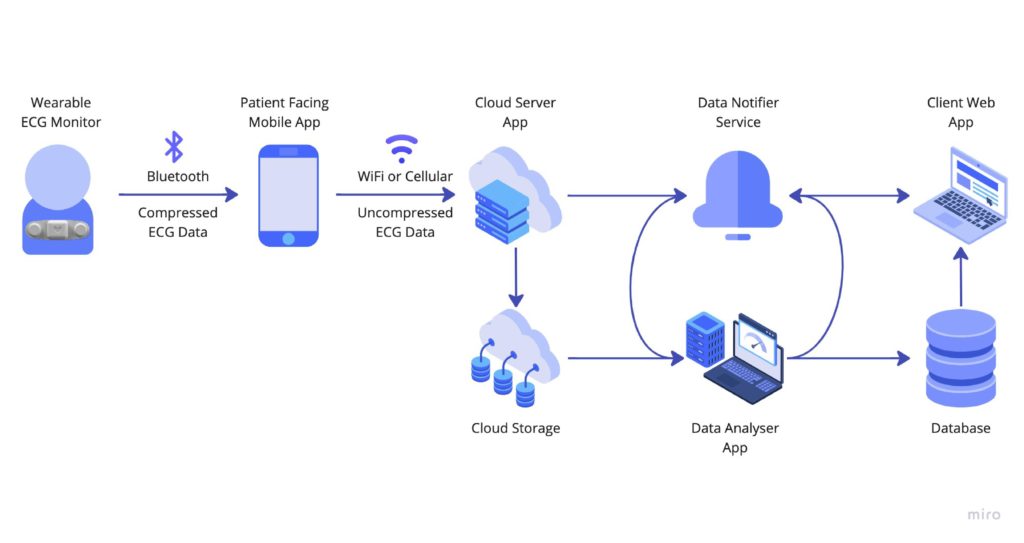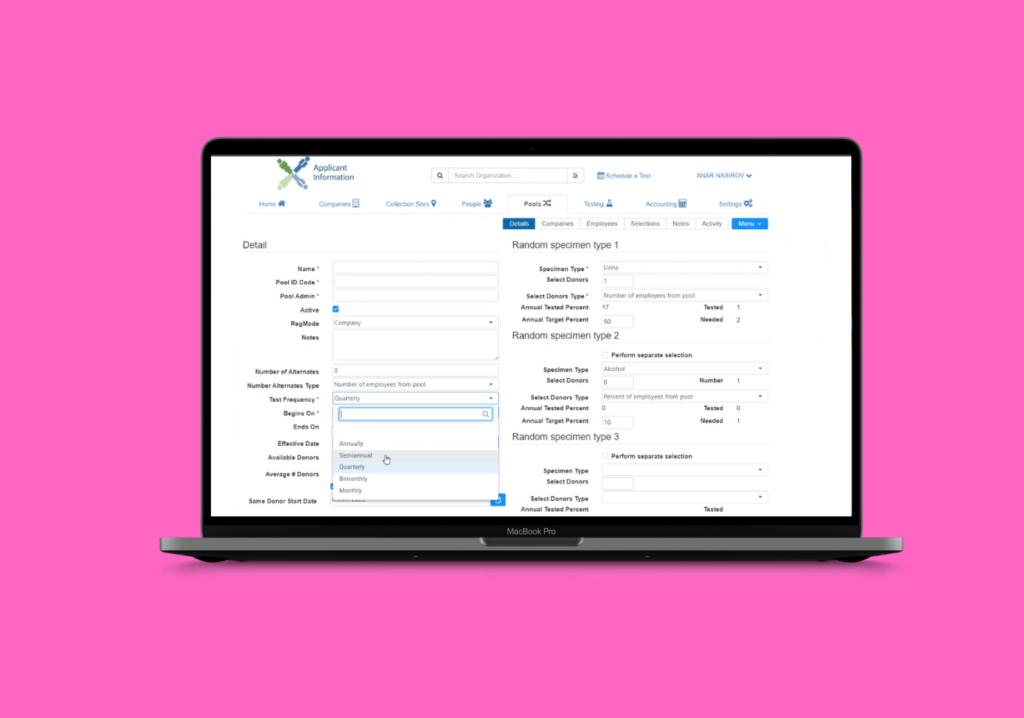In the midst of our current digital revolution, one particular trend within the global healthcare sector is steadily picking up speed. An increasing number of AI-powered startups are incorporating cloud technologies into their operational frameworks.
Indeed, Statista research forecasts that the global healthcare cloud computing market will skyrocket to a whopping $64.7 billion by 2025, expanding at a compound annual growth rate (CAGR) of 17.8% from 2021. It’s worth pointing out that in this rapidly developing landscape, cloud AI startups in healthcare are setting the pace with their enthusiastic adoption of cloud technologies.
In an environment where quick, data-driven decisions could mean the difference between life and death, it’s no surprise that these AI pioneers are seizing the opportunity to utilize the cloud’s potential to improve healthcare operations. But what’s pushing them to take on this transformative technology? And how is it reshaping the future of the medical industry?
In this blog post, we’re going to take a closer look at the blossoming relationship between cloud technology and AI in healthcare. We’ll explore the reasons these innovative enterprises are leveraging the power of the cloud and we’ll talk about how it’s impacting their operations and services.
This is truly an exciting time for innovation in healthcare, and we’re eager to unpack what’s going on beneath the surface.
Reasons for AI healthcare Startups to Use Cloud Technologies
In the rapidly evolving healthcare industry, startups are increasingly leveraging the capabilities of cloud technology in healthcare AI to transform patient care, data management, administration processes, and operational efficiency. As the digital foundation of their businesses, the cloud offers unique benefits that are critical to their success in this complex and highly-regulated field. Here, we explore the top reasons why healthcare AI startups are making the strategic choice to ride on the wave of the cloud ecosystem.
Scalability and Flexibility
Cloud technologies are inherently scalable, providing healthcare AI startups with the ability to easily expand or reduce their operations based on the current demand. This on-demand scalability eliminates the need for substantial upfront investment in IT infrastructure. Moreover, the flexibility offered by cloud platforms is unparalleled, allowing startups to adjust their resources and services dynamically, aligning them perfectly with their business requirements and market conditions.
Security and Compliance
Cloud ai startups in healthcare deal with sensitive patient data, making data security and privacy paramount concerns. Cloud providers are aware of these challenges and offer robust security measures, including encryption, firewalls, intrusion detection systems, and regular security audits. They also ensure compliance with healthcare regulations such as HIPAA in the US and GDPR in Europe, providing startups with a trustworthy framework for data handling and protection
Data Storage and Processing
In the realm of healthcare AI, vast volumes of data need to be stored and processed to develop, train, and deploy AI models. Cloud technologies offer secure, scalable storage and processing, vital for startups. For example, in certain instances, even electronic records could not be accessed from a distance, typically due to their unavailability on the cloud. The cloud resolves this by ensuring instant document access and fast processing of complex AI algorithms, empowering startups to deliver timely, accurate healthcare solutions.
Collaboration and Accessibility
Cloud platforms enable seamless collaboration among healthcare professionals, data scientists, and AI teams, enhancing the overall workflow and task execution. Cloud-based solutions are accessible from anywhere, anytime, enabling remote access and data sharing which is particularly useful in situations such as the ongoing global health crises. This increased accessibility can lead to better patient outcomes, as it allows for timely intervention and continuous patient monitoring.
Cost-Effectiveness
One of the key advantages of cloud technologies is cost-effectiveness. Instead of buying expensive hardware and maintaining an in-house IT team, healthcare AI startups can leverage the cloud at a fraction of the cost. The pay-as-you-go model of cloud services allows these startups to only pay for the resources they use, leading to significant cost savings and optimization opportunities. This frees up capital that can be better utilized for core business functions, accelerating growth and innovation.
It’s essential to understand and harness these advantages, which is where expert guidance and knowledge come into play. That’s why we encourage you to delve deeper into this topic by checking out the article Healthcare in the Cloud: What’s the Deal? This piece sheds light on the intricacies of cloud-based solutions in healthcare and guides you through making the most out of this game-changing technology.
Challenges and Considerations
The adoption of cloud systems in healthcare AI startups indeed carries several advantages, but it is not without its challenges and limitations. Recognizing these potential hurdles is essential for a comprehensive understanding of the technology’s application in this field. Here are some of the most common challenges and considerations.
Data Security and Privacy
Although cloud service providers typically offer robust security measures, data security, and privacy remain major concerns when using cloud technologies, especially in healthcare. Given the sensitivity of health data, any breach could have severe implications, not just in terms of regulatory penalties but also in the loss of trust and reputation. Thus, startups must ensure they have stringent security protocols in place, including data encryption, secure user authentication, and regular security audits.
Compliance and Regulatory Requirements
The healthcare sector is heavily regulated, with strict guidelines for managing patient data. In the United States, for instance, the Health Insurance Portability and Accountability Act (HIPAA) sets forth the standards for protecting health information. The General Data Protection Regulation (GDPR) serves a similar purpose in the European Union. Navigating these complex compliance and regulatory requirements can be challenging for startups, especially when operating across different regions. They need to ensure that their chosen cloud provider meets all the necessary standards.
Dependency on Internet Connectivity
Cloud services are dependent on reliable internet connectivity. Without it, accessing and managing data stored on the cloud can become problematic. This can be particularly challenging for healthcare facilities in areas with poor internet infrastructure or in times of network downtime. Startups need to have a contingency plan in place to handle such situations and ensure uninterrupted service.
Data Transfer and Bandwidth Limitations
The process of transferring vast volumes of data to and from the cloud can be time-consuming and may result in bandwidth limitations. This can impact the performance of AI algorithms and lead to delays in obtaining insights from data. Cloud ai startups in healthcare need to account for these potential limitations in their planning and choose a cloud provider that offers adequate data shift rates and bandwidth.
In conclusion, it should be said that the decision to implement cloud computing in an artificial intelligence start-up in healthcare should be balanced, taking into account not only the benefits but also potential problems. By proactively addressing these challenges, startups can leverage the power of the cloud, minimizing risk and improving patient care.
Tips for Implementing Cloud Technologies for AI Startups in Healthcare
Navigating the implementation of cloud technologies in the complex and nuanced world of medical AI startups can be challenging. But when done correctly, it can significantly enhance operational efficiency, data management, and the overall quality of patient care. Here are some tips to help these startups successfully implement and harness the power of cloud technologies.
Understand Your Specific Needs
Each startup is unique, with distinct goals, operational structures, and regulatory requirements. Therefore, it is essential to understand your specific needs before choosing a cloud platform. This includes determining the volume and type of data you will handle, the scalability required, and the security and compliance regulations to adhere to. A clear understanding of these aspects will guide your selection process and help identify the cloud services that best fit your startup.
Choose the Right Cloud Service Model
There are various cloud service models available including Infrastructure as a Service (IaaS), Platform as a Service (PaaS), and Software as a Service (SaaS). Each has its advantages and serves different needs. If you’re a startup focused on developing unique AI algorithms and models, an IaaS or PaaS model might be more suitable, providing you with greater control and flexibility. On the other hand, if your focus is on using existing AI applications in healthcare, a SaaS model might be more appropriate.
Prioritize Security and Compliance
Considering the sensitive nature of healthcare databases, startups must prioritize security and compliance when implementing cloud technologies. It’s essential to choose a cloud provider that offers robust security measures and complies with healthcare regulations such as HIPAA and GDPR. Regularly reviewing and updating security measures is also important to safeguard against evolving threats.
Plan for Scalability
The ability to scale quickly and efficiently is one of the main benefits of cloud servers. Startups should, therefore, plan for scalability from the outset. This means considering potential future growth and choosing a cloud provider that can comfortably accommodate this expansion without compromising on performance or security.
Leverage Professional Assistance
Implementing cloud technologies can be complex, particularly for startups with limited IT expertise. Leveraging professional assistance can be beneficial in ensuring a smooth transition to the cloud. This could involve hiring an outsourcing dedicated IT team or consulting with an external cloud implementation specialist.
Monitor and Optimize
Once cloud technologies have been implemented, regular monitoring and support are essential to ensure they are functioning optimally. This involves tracking performance, identifying potential issues, and making necessary changes. Effective monitoring can also help identify areas for cost optimization, ensuring you are getting the most out of your cloud investment.
In the end, the successful implementation of cloud technologies is a critical step towards revolutionizing healthcare through AI. By following these tips, healthcare and AI startups can make informed decisions that set them up for success in their cloud journey.
Empeek’s Experience
As a company, we at Empeek pride ourselves on our successful implementation and utilization of cloud technologies across various healthcare AI projects. Let’s explore some of our success stories that highlight the innovative use of cloud technologies.
Cardiac Telemetry System
We developed a scalable mobile cardiac telemetry system. This system, including an ECG patch and mobile app, enables real-time heart health monitoring for thousands of patients. Empeek took less than a year to develop this telemetry solution with a priority to design an architecture that could scale and track heart indicators in real-time, integrate with BadBeats, develop a cloud portal for multiple users, and develop an Android mobile application. The system is designed to help 20.1 million adults aged 20 and over with Coronary Artery Disease (CAD). The telemetry system sends cardiac data to experts for 24/7 monitoring and analysis, with results sent to doctors for review. Patients can also track their heart health and maintain an activity diary. The ECG device allows home monitoring, reducing overall healthcare costs. The product was built with FDA and HIPAA compliance in mind, considering the sensitive nature of the health data involved.

Drug Testing Management Software System
Our seasoned software team developed a comprehensive, web-based Drug Testing System for a US company specializing in drug testing and background screening. Empeek’s solution involved documentation, backend and frontend development, microservices, and report creation. The new system replaced the old, Windows-based one, offering real-time, any-device access to data and integrating all stakeholders, including vendors, companies, employees, and labs. The system also automated interactions, protected sensitive information, and simplified billing, effectively increasing productivity, reducing labor costs, and providing control over earnings and costs. It became operational in January 2019 and is HIPAA-compliant.

These examples offer a snapshot of Empeek’s successful case studies in cloud healthcare AI. Through effectively utilizing the scalability, flexibility, and additional benefits the cloud provides, we have consistently delivered efficient, innovative, and secure solutions tailored to each project’s specific requirements.
Conclusion
As you can see, cloud technologies aren’t just the talk of the town; they’re an influential game-changer that has the potential to turn the industry on its head. These technologies don’t just deliver enhanced scalability and flexibility; they also provide a solid foundation for data storage and processing. This is why they’re seen as the linchpin of innovation for cloud ai in healthcare startups.
If you ask us, with the right implementation and management, the transformative impact of these technologies is nothing short of remarkable. We’ve seen several successful AI healthcare startups, including a handful championed by Empeek, make great strides by leveraging cloud technologies. They’ve managed to boost efficiency, spark innovation, and improve patient care. These pioneers demonstrate the true power of the cloud when used effectively.
So, if you’re a healthcare AI startup and you’re keen on exploring the cloud’s potential, it’s wise to join forces with seasoned experts who can guide you. At Empeek, we’re all about creating cloud-based software solutions that are as unique as your needs.








